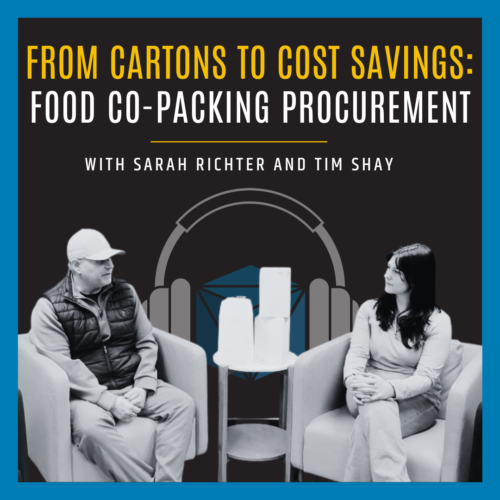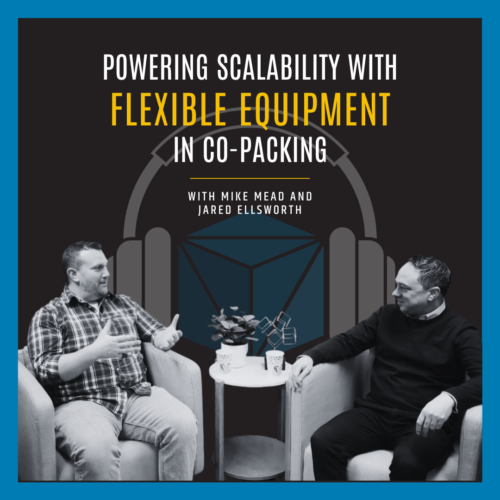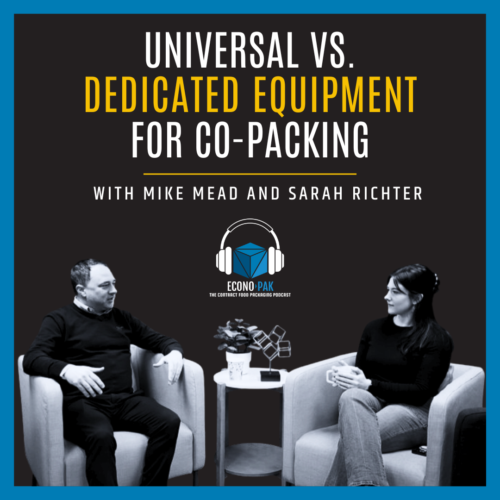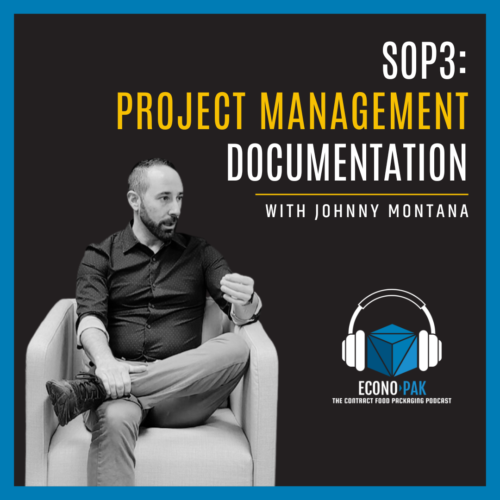Sourcing Packaging Materials for Co-Packing with Purchasing Supervisor Tyler Sisco
Get to know Tyler Sisco, the Purchasing Supervisor at Econo-Pak, as we explore the critical aspects of sustainable packaging solutions, fostering client relationships, and navigating the challenges of fixed cost solutions in procurement for co-packing.
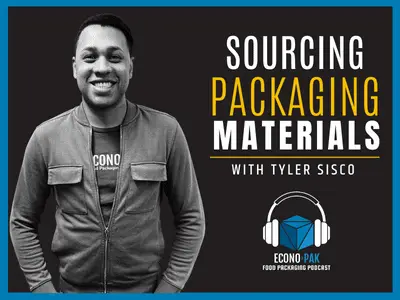
Packaging Procurement in Co-Packing
Sarah Richter: Welcome to the Econo-Pak Food Packaging Podcast. I’m Sarah, the Sales and Marketing Coordinator, and I’m here with Mike Mead, the General Manager. Today we’re going to interview Tyler Sisco, the Purchasing Supervisor, and we talk about sustainability and packaging, client relationships and fixed cost solutions. Let’s get to the show.
Mike Mead: Hey, thanks for joining us, Tyler.
Sarah Richter: Can you tell us more about your role at Econo-Pak?
Tyler Sisco: Sure. So basically, I handle all the Econo-Pak-owned inventory and materials that we source for our customers. And that’s pretty much it in a nutshell. There’s a lot of different levels, and we can go deeper into that.
Essentially, we have two types of customers. We have customers that provide their own materials, and then we have customers that either have an idea for packaging or have packaging that needs to be altered. So that’s where I come in. I meet with the customers and we go over what the goal of the packaging is, basically get with our team of vendors and we find out the best solution for the customer. I mean, basically, the goal of most every customer is low cost, high quality. So we work with that and we go from there.
Sarah Richter: So you work directly with the customer. Do you work with other departments in Econo-Pak too?
Tyler Sisco: Yeah. See, the cool thing about my position is I pretty much work with every department. Since we are a co-packer, every department has to do with packaging. I mean, when you’re sourcing the material, whether it’s a perishable material, any type of raw material, you’re dealing with customer service, you’re dealing with shipping, receiving, you’re dealing with quality, you’re dealing with upper management, so you’re across the board. You’re dealing with everyone in the building a little bit.
Types of Packaging and Product Shelf Life
Sarah Richter: And can you give us some examples of materials that you would buy?
Tyler Sisco: Sure. For the most part, we source paperboard cartons, corrugate boxes. We do cold seal films, heat seal films, heat seal films. We do poly trays, poly bags. I mean, pretty much any packaging material that’s used.
Mike Mead: I know that I often have to come to you to… I have a customer that has a specific type of project, and I’m newer to the packaging side of things. And I know with all of your experience, you always have those great recommendations of, and also questions that we should be asking, like are they looking for a certain type of vapor barrier or substrate or those kinds of things.
So why are those such important questions when we’re coming to you looking to help provide a customer with the film?
Tyler Sisco: Well, they’re important because depending on what you’re packaging, you obviously want to get the best shelf life for your product. You want the best package integrity. You also want it to be able to be shipped properly. So depending on what the commodity is, you want an all around just effective, efficient packaging for it. Asking those questions gets you an idea of sometimes the customers really don’t know, it might be their first time. You want to just ask them basic questions, and then you can get a bigger scope of the project from a packaging standpoint.
Mike Mead: Yeah, I noticed that with some of the R&D programs and the trials that we run. It’s always testing out different types of film, how’s it going to run through our equipment? And like you said, a lot of times the customers are innovating something and they’re not really sure how it should be packaged. So I think that’s a great service that we provide, is being able to guide our clients, our customers, in a direction that would be very suited for that type of product. So that’s really cool and interesting.
Tyler Sisco: Definitely.
Sustainability Initiatives in Co-Packing
Sarah Richter: We have quite a few clients who have sustainability initiatives. So how does that play into your role?
Tyler Sisco: Well, the cool thing about that is the whole market is moving towards sustainability, a higher level of sustainability. For the most part, a lot of packaging materials are considered sustainable, most are recyclable. With the new initiatives that are being put in place, they are focusing more on that aspect of the current properties of the packaging materials.
And then they’re also creating newer materials that are more sustainable, can be recycled more times, that are made from recycled materials. So a lot of our customers like that because, I mean, anything to lessen your carbon print is a good thing. So we always do offer that, depending on if it fits the customer’s needs or not, more or less. There isn’t a more sustainable option for every packaging available.
Relationships with Materials Suppliers
Sarah Richter: So how do you go about selecting and maintaining relationships with suppliers?
Tyler Sisco: We have a large network of suppliers that we work with regularly, whether they are contracted by our customers or handpicked by us. It all boils down to price, quality, availability, lead times. We want to make sure that we’re providing the best service, and that means getting the product as soon as possible and at the most competitive price.
And with that, there comes a lot of supplier negotiations that go along with that. So since we do have such a large network of suppliers, we do have significant buying power to bring in the best possible material for the customer.
Sarah Richter: What challenges do you face when you’re procuring materials?
Tyler Sisco: Luckily, we’re heading out of a lot of the global supply chain issues that we were faced as a nation as a whole in the past few years. Lead times are always, depending on, I mean, the climate, it could be international affairs that are going on in the world. I mean, there are so many different things that can impact procurement for raw materials, but luckily, at this time, we’re not really seeing that many challenges. So we just deal with them as they come along.
Custom Turnkey Solutions for Co-Packing Clients
Mike Mead: So when it comes to bringing in a client and they don’t really have the packaging figured out yet for their product, what are a few key questions that will help us with the customer and guide the solution with you from a purchasing standpoint?
Tyler Sisco: See, I love this question because a lot of times you get customers and they’re so motivated, they’re so excited, and the sky’s the limit. And sometimes there’s just so many different moving parts that you have to reel everything in a little bit just to try to find out what exactly they actually do want.
And that’s something that I communicate with a lot of the sales reps on our sales team is that these are some basic questions that you need to ask. The volume is a big deciding factor on price, whether or not this is going to be going into specific types of store locations, club stores, certain retailers. Everyone has different specs for their packaging.
Mike Mead: I know one of the services from the sales side of the organization is that we like to be able to help provide a turnkey solution for our customers. And each of our departments play a critical role in providing that type of service, especially you.
Tyler Sisco: That’s actually one of the really cool things that we offer. Our turnkey solution is we will purchase the materials, we do the co-packing, so the customers can really just focus on the brand and the product itself. And we take that piece away, so they don’t really have to worry about the sourcing the materials or doing the legwork with the vendors. We just provide everything and the labor and just offer that solution to them.
Mike Mead: Yeah. And it provides a fixed-cost solution for our clients too. So they pretty much have all of their costs in line, and all they have to do is focus on going out there and selling and understanding what their true cost factors are going to be, working with that turnkey type of solution.
And we’ve made a significant investment as a company with each of our departments to make sure that we can provide those services from the logistics and purchasing and everything else in the turnkey solution. The relationship that we as a company have with our clients, it’s more of a partnership, and that’s from every single department. So I’m sure that you can relate to that with your department.
Tyler Sisco: Definitely. And I think that might be probably my favorite part of the job. It’s seeing that vision come to life with a customer. I mean, you really form a bond working on a project and seeing it from this seed all the way out through fruition. It’s actually pretty cool.
Every customer’s different. Even like products could be different in so many different ways. So it’s really important for us to touch base with our customers regularly, make sure that we’re in line on everything. Deadlines are always looming. We just try to work together.
Tyler’s Interests

Sarah Richter: Tyler, to wrap up this segment, can you tell us what you like to do outside of work?
Tyler Sisco: I’m an aspiring Lego master. It’s one of my favorite pastimes. I love music. I play piano. I’m dabbling in cello right now. So I just try to keep busy. I mean, I have a beautiful 6-year-old yellow lab that is my heart, and he takes up a lot of my time.
Sarah Richter: What’s his name?
Tyler Sisco: Pop-Pop. He’s an old soul.
Sarah Richter: Aw. Well, thank you so much for joining us today. It was great talking to you and getting to know more about your role here.
Tyler Sisco: Thank you.
Outsource Sourcing with Econo-Pak
This conversation with Tyler sheds light on the pivotal role of procurement in the co-packing industry, emphasizing the balance between cost-efficiency, quality, and sustainability.
Econo-Pak’s commitment to offering turnkey solutions and our proactive approach to addressing the demands of the market illustrate the importance of adaptability and partnership in achieving long-term goals. For companies in the food packaging sector, embracing these principles could not only enhance their operational efficiency but also contribute to a more sustainable future.
Let's start scaling.
Is your demand outpacing your ability to package your own product? Then consider outsourcing with Econo-Pak.
With over 40 years of experience working with both small brands and Fortune 500 companies, we are capable of handling your specific dry food product.
Get in touch with our team for a fixed-price quote for your project.

